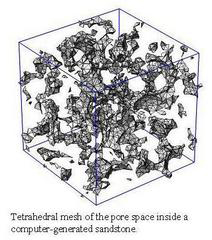From watershed
hydrology to saltwater intrusion monitoring and modeling to numerical
modeling of the hydrodynamics in the lower Mississippi River, the
issues of water intensive ecosystem and environmental management,
monitoring and understanding are critical for our country. Students
learn firsthand how to deal with such interdisciplinary issues
through the National Science Foundation’s (NSF) Integrative
Graduate Education and Research Traineeship (IGERT) program.
Trainees
from the University of Rhode Island’s (URI) IGERT program Assessing
Change in Coastal Ecosystems: Integrating Natural and Social
Sciences, led by Principal Investigator Peter August, integrates
ecology, biology, fisheries, natural resources science and the social
sciences -- including economics, governance, planning, coastal policy
-- to develop the skills required for effective watershed management.
In collaboration with the government of Tanzania, developed as part
of the International training component of IGERT, and in conjunction
with the U.S. Agency for International Development (USAID), trainee
Cathy McNally is collecting baseline data on the Wami River
watershed, which is the only water source for the world’s third
fastest growing city, Dar es Salaam, located 80 miles north. She will
add this information to the work she and others are conducting in the
United States to develop a holistic view of watershed issues and
management solutions. Trainee Kathy Sullivan also works in Tanzania,
where she helps evaluate sustainable livelihood options as a method
of better defining options for coastal environments. She is
helping to assess the economics of seaweed farming and its watershed
management impact. To prepare trainees for today’s global
interdisciplinary research environment, URI’s IGERT project
requires trainees to spend a semester in residence working on coastal
issues in a non-academic setting.
As part of Louisiana State
University’s (LSU) IGERT project on Multi-scale Computations of
Fluid Dynamics, led by Principal Investigator Sumanta Acharya,
trainees conduct research in coastal management from the
perspective of modeling and intervention. Trainee Samantha Danachuk
has taken advantage of her IGERT interdisciplinary training in
engineering, environmental science, and computer science to develop a
numerical model simulating the hydrodynamics in the lower Mississippi
River. This work serves as the basis for understanding and guiding
future petro-chemical developments on the river, which is especially
important in light of the restoration plans called for in this area
of the river. Another LSU IGERT trainee, Kevin Tubbs, has linked his
interdisciplinary training to develop methods for modeling the
effects of saltwater intrusion on subsurface and surface water
resources -- a critically important issue in coastal areas.
The
interdisciplinarity brought to bear on these problems transforms our
ability to study them and to develop solutions to complex issues
such as water management.
Partners:
Government of Tanzania, U.S. Agency for International Development
More Photos:

|
Image
of tetrahedral mesh.
Credit: Nathan Lane and Karsten Thompson
Permission Granted
|
